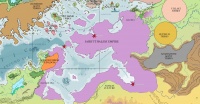Jairutthalese Empire
A very ancient empire of Kalama that flourished around 7,300 AS, the Jairutthalese Empire is so named after the founder of the dynasty that established it, King Jairutthala. The Jairutthalese Dynasty (7,346 AS to 7,284 AS) came to rule the territory of Kalama, Jakubya (Gecubia or Throvy), Yephalah, Shelekhumbia, Orthont, Thyria, Narshad, and some of the Ithatian Isles and is part of the greater period known as the Bhonippa Kingdom. It waged war against the Gorcorumbese Giants of the Ephysgæes. The history of the Jairutthalese Empire like most history of Kalama before the City-Sate Period of Kalama is thought to be dubious. Archeological evidence supports some connection among the core territoies reported for the Jairutthalese Empire but is mostly lacking for lands outside of Kshandiguh and Jakubya. Native scholars rely heavily on the Jairutthalakumi, the epic poem of King Jairutthala.
For much of the Jairutthalese period, the island city of Tanshakilu was a royal capital along with Kathyabrumya. The Jairutthalese Empire was considered the culminating epoch of the eighth millennium before Salmakhamer in the Pallathantic-Memnosian Region of the world. About three hundred years later, the vestiges of the Jairutthalese Empire succumbed to Chaos Rulers who dominated most of the seventh millennium before Salmakhamer.
King Jairutthala
Our knowledge of Jairutthala derives largely from the epic that bears his name. There are other literary sources and inscriptions, but these all date from later ages and their historicity is uncertain. Jairutthala, the founder of the Jairutthalese Dynasty, was thought to be the illegitimate son of the royal prince and the chief scribe's daughter. He became a powerful wizard and when the ruling dynasty fell into civil war, usurped the throne.
Jairutthala was a cunning strategist. He exploited the reorganized military of the Ithwa-Tanchalese Dynasty and expanded it. The Kalaman army included elephants and Uhlak mercenaries.
See Also
| This article is a stub. It requires further development by the creator. |
